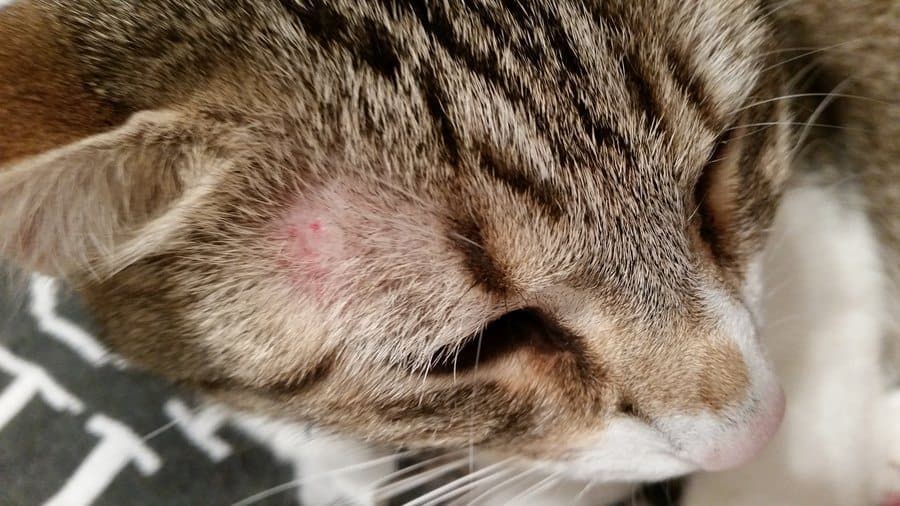6 Common Skin Problems Pets Have

Our pets, like people, can get a variety of skin conditions. Many common ailments are readily remedied, but if not discovered and treated, they can cause your pet discomfort or worsen into more serious conditions.
The good news is that most common skin problems can be managed or even cured with the help of your veterinarian. If your pet is suffering from any of the common skin diseases listed here, there’s a good chance she can find relief.
1. Dry or Flaky Skin
Dry skin can be an indication of a much greater problem such as allergies, parasites, or serious medical diseases like hypothyroidism. If your pet has dry skin on a regular basis, it’s crucial to see your veterinarian to find out what’s causing it.

What to do about it:
Dry skin caused by common environmental irritants such as harsh soaps or shampoos, cold temperatures or dry air, or a lack of sufficient nourishment can be readily rectified by altering your pet’s routine. A change of diet or using medicated shampoo and conditioner should suffice.
Read here for some examples of how to deal with a cat’s itchy skin.
2. Allergic Dermatitis (Allergy-Induced Skin Rash)
Your cat or dog may be allergic to a variety of household goods, such as grooming products, food, or environmental variables like insects, dust, or pollen.

If your pet has a skin allergy, it may show up as a rash or itchy, flaky, or inflamed skin, but it’s better to see your veterinarian to make sure it’s not anything else.
Noticed that your dog has black spots? Check this out!
What to do about it:
If your pet has severe allergies, your veterinarian may recommend medication to control them. Whether or whether medication is required, there are a number of things you can do as a pet parent to reduce irritants and manage your pet’s allergies.
For cats, Solid Gold Grain Free Chicken & Egg Dry Cat Food can help if certain proteins are causing these allergies in our feline friends.
3. Ringworm

Ringworm is actually a fungus, despite the fact that it appears like a parasite. This infection might damage your pet’s hair, skin, or nails, and it’s usually simple to spot. It appears as a raised, round ring around the diseased area, with hair loss, brittle or broken nails, and scabby-looking sores.
What to Do About It:
If your pet has ringworm, you can use over-the-counter sprays to help alleviate the symptoms. However, your veterinarian is likely to recommend a mix of topical and oral antifungal drugs for treatment.
Read here for more info on these internal parasites!
4. Yeast Infection
Yeast infections in dogs and cats can cause itchy, inflamed, or discolored skin, and they’re most likely to show up in warm, damp areas like the paws or ears, where the yeast can thrive.
What to Do About It:
If your pet has a yeast infection, your veterinarian will most likely prescribe a topical treatment to treat it, but if the infection is more serious, your veterinarian may recommend oral drugs.
Avoid grain and carbohydrates like sweet potato and maize. Single protein goods we suggest are Addiction Grain Free Wild Kangaroo & Apples Dog Dry Food.
Shampoo solutions like Dermcare Aloveen Oatmeal Shampoo can also help in this situation.
5. Mange

Tiny parasitic mites are the root of this skin problem, which usually manifests as patches of baldness. Mange is divided into two types. Mites that burrow beneath the surface of the skin produce the first, and mites that build their home in your pet’s hair follicles create the second.
What to Do About It:
Since the puppies’ immune systems are still maturing, Mange is more common in them. If your dog has mange, your veterinarian will most likely treat it with a topical cream, medicated shampoos or soaps, and oral medication to destroy both the living mites and their eggs, if the disease is severe. If you suspect your dog has Mange, you should seek treatment from a veterinarian.
6. Fleas and Ticks
Fleas are another insect that may be quite bothersome to your pet. Fleas, despite their small size, leave behind irritating, red bites on your pet’s skin, as well as apparent droppings or eggs on her coat. Because fleas feed on blood, an infestation can lead to blood loss, anemia, and other serious complications for your pet if left untreated, so it’s critical to get her to the doctor as soon as possible.
Here’s a beginner’s guide to Fleas and Ticks for more info
What to Do About It:
The owners should conduct a thorough cleaning of the entire house, just like they would with allergy problems, to get rid of as many of these parasites as possible. Your veterinarian will most likely prescribe topical and/or oral flea treatments, as well as medicated flea collars, to guarantee that fleas do not return.
Below are some of the other recommended products you can buy at Perromart.
Absolute Plus Colloidal Silver 4oz 118ml (Buy it here: https://bit.ly/3KL7ZvF)
KEY FEATURES:
- Natural Antibiotic, Antiviral & Antifungal
- Helps wounds, skin infections and hot spots heal
- Suitable for cats, dogs and all small animals
Dom & Cleo Colloidal Silver Dropper For Dogs & Cats 2oz (59ml) (Buy it here: https://bit.ly/3CLFDhX)
KEY FEATURES
- Natural Antibacterial, Antiviral & Antifungal
- Helps wounds, skin infections and hot spots heal
- No artificial stabilisers, chemicals, colouring or additives
- Suitable for cats, dogs and all small animals









